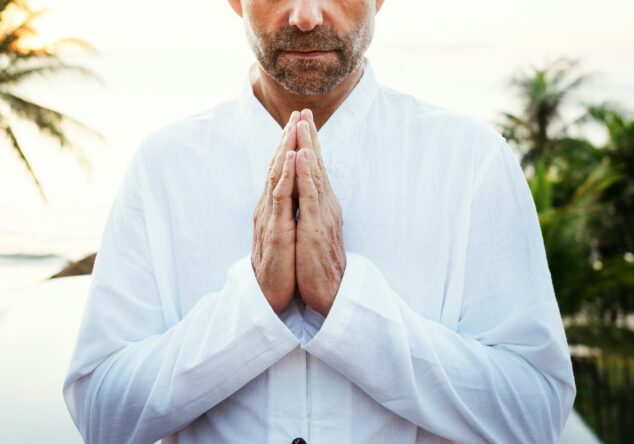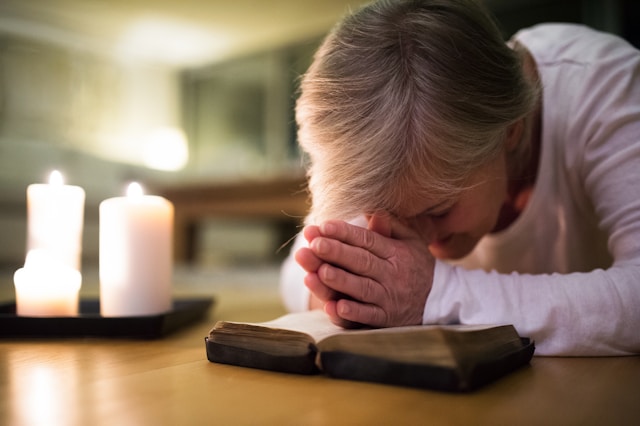Religion can be a powerful source of peace, purpose, and community.

However, like anything deep and meaningful, it can also become a way to avoid hard feelings, tough questions, or parts of life we’d rather not deal with. When it’s grounded and honest, faith feels like an anchor. But when it’s used as a way to escape or deny reality, it can turn into something hollow or even harmful. Here are some positive signs you’re engaging with religion in a way that actually supports your growth, not just hides your pain.
1. You let it guide you, not silence you.

When your faith is healthy, it doesn’t tell you to ignore your doubts, struggles, or emotions. Instead, it gives you space to bring them in. You don’t feel like you have to shove your real thoughts under the rug to stay “spiritual enough.” Instead of muting your inner voice, it helps you make sense of it. You can wrestle with questions, sit with tension, and still feel connected to something meaningful. It’s not about perfection; it’s about being real.
2. You don’t use it to shame other people (or yourself).

Healthy faith doesn’t thrive on guilt trips or superiority. If you’re able to hold your beliefs with humility, not as a weapon or a way to feel “better than,” that’s a good sign you’re doing it from a grounded place. You also don’t beat yourself up for falling short. You see growth as part of the process, not a reason to punish yourself. There’s space for grace for other people and for you.
3. You ask questions without feeling like you’re failing.

Blind obedience might feel easier at times, but healthy spirituality welcomes curiosity. You’re allowed to wonder, rethink, even change your mind, and your faith still holds up. If your beliefs give you the freedom to explore instead of scaring you into silence, that’s a sign it’s something real, not just something you’re clinging to because you’re afraid not to.
4. You’re still present in real life.

Some people get so caught up in the idea of spiritual life that they start disconnecting from the actual life they’re living. However, healthy religion doesn’t ask you to check out of the world. It helps you show up more fully in it. You still take care of your responsibilities, your mental health, your relationships. You don’t use faith as an excuse to avoid hard conversations or messy emotions. You live here, not in a bubble.
5. Your beliefs evolve as time goes on.

If your faith has changed as you’ve changed, that’s a good thing. Healthy spirituality grows with you. It doesn’t freeze you in the mindset you had when you were 15. You’re not abandoning your values. You’re just learning how to live them more honestly, with more context and life experience behind them. That kind of growth makes your beliefs deeper, not weaker.
6. You don’t see every challenge as a punishment.

When something goes wrong, your first thought isn’t, “What did I do to deserve this?” You understand that life is hard sometimes, not because you’re bad, but because that’s part of being human. Instead of seeing God or the universe as out to get you, you lean into faith to help you navigate tough seasons. It’s a comfort, not a cause of fear or self-blame.
7. You feel more compassionate, not more judgemental.

One of the clearest signs your faith is healthy is that it softens you. You find yourself extending more grace, not looking for reasons to exclude or correct people who think differently than you do. You don’t need everyone to agree with you to feel secure. Your beliefs make you more kind, more curious, and more open-hearted, not more defensive or controlling.
8. You don’t expect it to fix everything.

Faith can help you find strength, clarity, and comfort, but it doesn’t erase grief, trauma, or everyday stress. Healthy religion isn’t about pretending everything’s fine if you just pray hard enough. Instead of bypassing the hard stuff, you learn how to face it with support. You still go to therapy, set boundaries, and deal with reality. Your beliefs are part of the healing, not a shortcut around it.
9. You’re okay with mystery.

You don’t need to have all the answers. You’re not uncomfortable sitting in the unknown or admitting when something doesn’t fully make sense. That’s a sign of maturity, not weakness. Healthy faith makes room for awe, not just certainty. It gives you permission to live in the questions without panicking, and to trust that some things will unfold in time.
10. You’re not afraid of people who believe differently.

You don’t feel threatened when someone has a different worldview, religion, or spiritual practice. In fact, you’re often more interested than defensive. Their beliefs don’t shake yours, and that’s exactly why you’re able to respect them. When you feel secure in your own values, you don’t need to convert or convince everyone around you. You know that your path doesn’t have to cancel out someone else’s.
11. You use it to take responsibility, not avoid it.

You don’t use “everything happens for a reason” as an excuse to sit back and do nothing. Your beliefs challenge you to take action, reflect on your behaviour, and grow through your choices. Spirituality, when it’s grounded, pushes you toward accountability, not avoidance. It doesn’t let you pass the buck. It helps you step up in a way that feels aligned and intentional.
12. You’re not afraid of being seen for who you are.

You don’t use religion to mask your personality, your story, or your struggles. You’ve let go of the need to present a perfect version of yourself to be accepted by your faith community or by a higher power. That kind of authenticity makes everything deeper. You’re not hiding behind beliefs; you’re bringing your full self into them. And that’s when faith starts to feel like a safe place, not a stage.
13. You’re motivated by love, not fear.

Your actions come from a place of compassion and connection, not punishment or pressure. You’re not trying to earn worthiness or avoid hellfire. You’re living out your values because they actually mean something to you. When love is the fuel behind your beliefs, everything shifts. You make choices that feel rooted, not reactive. You show up with heart instead of obligation. And you grow from the inside out.
14. You don’t use it to bypass your humanity.

Being spiritual doesn’t mean you don’t get angry, hurt, or messy sometimes. Healthy religion helps you integrate those parts, not avoid them. You’re allowed to be both grounded and growing, both spiritual and still figuring it out. You don’t feel the need to perform goodness or pretend you’ve got it all together. You just keep showing up, flaws and all. Amazingly enough, your faith walks with you, not ahead of you, pretending to have all the answers.




